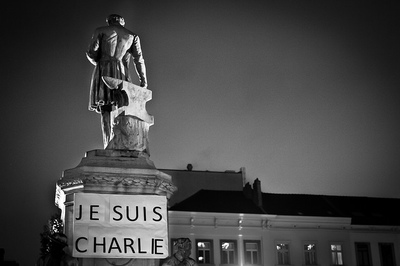The PEN American Center’s decision to award its annual “Freedom of Expression Courage Award” to Charlie Hebdo has divided the organization’s members, inspired protests, and led some to ask: Does honoring the magazine’s courage—it kept publishing after the attack that killed nine of its staffers—amount to honoring its controversial content? Was Charlie Hebdo “punching down” against France’s Muslim minority? And if so, should it be regarded as a satirical publication or just a bully?
The sensitive political context surrounding PEN’s award is reflected in the somewhat indirect way in which many have chosen to approach it. Writing in n+1, Keith Gessen expresses discomfort at the way in which Charlie Hebdo was taken up as a free-speech cause in the United States:
When people in France, in their mourning, declared “Je suis Charlie,” they were expressing grief, an identification with the victims of horrific violence. But what were people expressing when they said “Je suis Charlie” in the US? It was a tragedy. But what did it mean to identify with those particular victims, at this particular time? I could be wrong, but it seemed to me that “Je suis Charlie” was a way for people to re-pledge their commitment to the War on Terror that had been announced by the United States in 2001 […] in the American context, I did not feel like I wanted to be Charlie, not in the sense in which it was being used in January of this year.
This is, Gessen admits, one person’s interpretation of the American political mood. But even so, these worries betray an unwarranted suspicion of motives. Why the apprehension about Americans who identified “with those particular victims, at this particular time?” Journalists had just been murdered for offending religious fundamentalists—blasphemy law enforced gruesomely and mercilessly at gunpoint. The timing is obvious and requires neither explanation nor justification.
What does require justification is the implied guilt-by-association suggesting that Americans saying “Je suis Charlie” are closet supporters of the War on Terror, wrapping their aggressive foreign policy views in the banner of free speech. I don’t doubt for a minute that such people exist. But I also don’t doubt that one can be sickened without qualification by the Charlie Hebdo attackers while also opposing America’s terrorism policies.
I’m unconvinced, however, that such considerations should make much of a difference in how we react to the attack. Attacks on free speech are deplorable, even if some of the people who agree with you have other priorities in mind. Many of the people offended by the PEN award assure us that they are, in general, supporters of free speech—but that they made uncomfortable by this speech and the allies it has attracted. Matters of fact aside (it does not appear, for instance, that Charlie Hebdo disproportionately mocked Islam), that principle is not likely to age well. When are free speech controversies easy? The people most at risk of being killed for their views are likely to have said a few things we find offensive, likely to have attracted some unseemly admirers. Those who specialize in blasphemy and irreverence will flirt with the boundaries of good taste, or gleefully violate them.
Gessen, insistent that we recall the context of the debate over the PEN award, notes: “We continue to prosecute a vicious, endless war on terror; people are endlessly being killed, jailed, and harassed in the name of this war […] To me, the most serious problems facing our country are income inequality, strongly correlated with race. Freedom of speech is far behind; Islamic terrorism even further.” All this may be true. We could worry that our full-throated defense of free expression will be mistaken for a defense of war. And we could caution, as other writers have urged, against expressing too much solidarity with the victims (until more sympathetic ones can be found, one assumes—ironically enforcing the same standards of victim-perfection that the right would like to enforce surrounding police violence). But these strike me as excessive capitulations to context. We can still admit to complex beliefs about a complex world; still insist that our free speech views don’t commit us to a neoconservative foreign policy; still say that we are not defined by our allies on a given issue. These are all admissions of nuance and shades of grey. On this particular issue, we have to insist on such nuance in order to speak straightforwardly at all.

Click to
View Comments